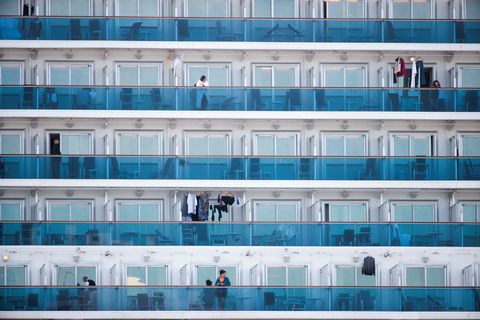They weren’t even going to take the cruise—they were too busy. But at the last minute, Katherine Codekas and her husband Matthew Smith decided since they had already bought the tickets, they’d make the time. So on January 13, they flew to Tokyo and boarded the Diamond Princess, a two-week cruise that embarked from Yokohama, Japan and would take them to several ports in Asia, including Hong Kong and Taipei.
They hadn’t heard much about the Coronavirus before boarding—at the time, the outbreak was ramping up in China, and had spread to other Asian countries, but wasn’t on the radar of most Americans. But when the ship stopped in Hong Kong on the fifth day of the cruise, the driver they hired to take them on a tour was wearing a mask and coughing a lot. Codekas remembers thinking, Should I be worried?
Soon, she had her answer. On the 14th day of the cruise, an announcement came from the captain: someone on board had tested positive for the virus. Soon, the number of positives grew to 10, then higher, and everyone would have to be screened and quarantined. Codekas and Smith were sent into their 500-square-foot cabin and told not to leave. They would spend the next 16 days there, never getting a break from each other.
In many ways, Codekas and Smith were better positioned than some couples to spend an intense amount of time together. They have been married for 22 years, live alone together, and as divorce lawyers who run a private practice together, they have some insight into what keeps couples together or wedges them apart.
But their experience was an even more extreme version of what most couples are facing now as they are stuck at home because Codekas and Smith literally could not leave their room—they couldn’t take any breaks from each other or even leave one another’s line of sight. “You could not cross the threshold of your room and no one could come in your room,” says Codekas. While other passengers got breaks to walk the hallways, Codekas and Smith didn’t because their room had a balcony, which was deemed sufficient to keep them entirely contained in their cabin.
So how did they cope? They had a few strategies. One was to immediately set a routine. “We’d get up, have coffee, take showers, tidy up the room, walk around the 500-square foot room like it was a race track, look out the window, and then it was time for bed so we could get up and do the whole thing over again,” Codekas says.
Meals became the highlights of their days. “They would bring food three times a day, and it was served in a really careful way—you could only take things off the trays, they wouldn’t hand it to you,” she says. “The food was really good, and they would try to bring us special stuff.” They ate a wide range of meals, including goulash, smoked turkey salad, pork adobo, Moroccan stew, smoked salmon mousse, nasi goreng, ceviche, fish and chips, coqu a vin, cottage pie, and Japanese beef curry.
Codekas also set a cleanliness requirement for the cabin, an idea that would work well for couples quarantined in larger spaces, too. “I’m fastidious and I can’t live without complete order, so we definitely had that in that tiny room,” she says. “Matt was very accommodating. He didn’t say, ‘What do you care if I’m sitting around in three-day old underpants? No one else is here.’ No, everyone gets up and showers, we cleaned the cabin, cleaned up after meals, because if you don’t, then things are really going downhill.”
Some of their duties mirrored their home life. “Somebody still has to take trash out,” Codekas says. “That’s Matt’s job at home, so that was his job on the ship, too.” Though he didn’t have to take it far‚ he just left it outside their door.
Still, there was some tension. The biggest fight came from a good idea: They decided to find and explore some separate interests. For Codekas, that meant watching as much mindless TV as possible. Say Yes to the Dress was a favorite. But Smith chose to reactivate an old unused Twitter account to post photos of the food they were served.
At first, it was only a small annoyance for Codekas. “He’d say, ‘We can’t start eating until we take pictures of the meal,’” she says. But then media outlets noticed Smith’s posts and interview requests came rolling in. Codekas would seek refuge in the closet while Smith did interviews to give him space and keep herself out of the shot. She tried to be supportive of his pursuits, but the requests were constant. “She didn’t want to be on camera, so she got frustrated,” says Smith.
Codekas says she found the interviews invasive. “He’s on the phone, Skyping with all these media outlets, and so suddenly we were no longer alone.”
Many interviewers had the same question: Are you bored? “But that was the least of our problems,” Smith says. “Because everyone wanted to contact me, to know what was going on. It was constant. It was just something to do at first, but then every day so many people were interested.”
Codekas found the requests from media outlets in very different time zones the most challenging. “It was a source of friction because it went on 24 hours a day,” she says. “I just wanted to get to sleep, but Matthew would have to Skype at 3am. I would say to him, ‘Oh for Christ’s sake, come on.’” Smith laughs as Codekas recounts the memory.
But aside from the squabbles over the media requests, in some ways, Codekas and Smith say they got along even better than at home. There were no chores or bills to argue about, no one to blame for not changing the cat litter.
The couple also enacted another strategy: find a common enemy. They bonded by making fun of people they could see from their balcony, including some passengers who were screaming, “America, come save me.” Also, as they watched preparations for the American evacuation from their balcony, there was a woman who showed up to coordinate the effort dressed in stilettos with a giant designer purse who earned much derision from the couple. And kept their focus on the end goal. “We just had to stay healthy so we could get off the boat, so that’s what we focused on,” Codekas says.
They did stay healthy; they never showed symptoms of coronavirus and were allowed to disembark. They decided not to be airlifted out by the U.S. government and spend another 14 days in quarantine on a military base, and instead got off in Japan and spent 16 days there before they were able to fly home. Now, Codekas and Smith are back home in Sacramento, living together and running their law practice again.
Their work as divorce attorneys makes them something of anthropologists for troubled couples, and the couple says there were other passengers who didn’t seem to deal with the quarantine very well. “One man told us his wife managed to come up with every grievance and transgression from their entire marriage,” Smith says. They also talked with a newlywed couple who were “freaking out” because they had never spent this much time alone together before, and were pleading for President Trump to come get them off the boat.
Codekas and Smith agree that being stuck in a tiny room together is a good way to tell whether your marriage is built to last. “If this pandemic was the catalyst to get you in our office, it probably means the marriage wasn’t going to work anyway,” Codekas says. “There’s always something that gets people into our office—maybe being quarantined at home was what it took for some people to realize they don’t want to live like this anymore.”
So, did they pick up any new clients among their fellow passengers? “Time will tell,” Smith says.

